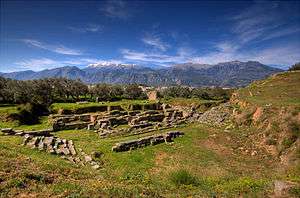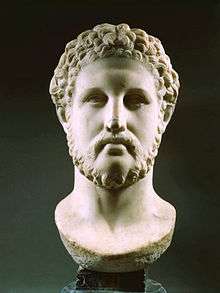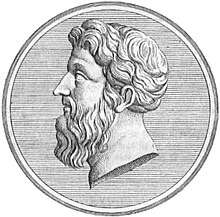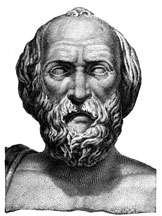Laconic phrase
A laconic phrase or laconism is a concise or terse statement, especially a blunt and elliptical rejoinder.[1][2] It is named after Laconia, the region of Greece including the city of Sparta, whose ancient inhabitants had a reputation for verbal austerity and were famous for their blunt and often pithy remarks.

Uses
A laconic phrase may be used for efficiency (as during military training and operations), for emphasis, for philosophical reasons (especially among thinkers who believe in minimalism, such as Stoics), or to deflate a pompous interlocutor.

A prominent example involves Philip II of Macedon. After invading southern Greece and receiving the submission of other key city-states, he turned his attention to Sparta and asked menacingly whether he should come as friend or foe. The reply was "Neither."[3]
Losing patience, he sent the message:
You are advised to submit without further delay, for if I bring my army into your land, I will destroy your farms, slay your people, and raze your city.[4]
The Spartan ephors again replied with a single word:
If.[5]
Subsequently, neither Philip nor his son Alexander the Great attempted to capture the city.[note 1]
In humor
The Spartans were especially famous for their dry, understated wit,[7] which is now known as "laconic humor". This can be contrasted with the "Attic salt" or "Attic wit" – the refined, poignant, delicate humour of Sparta's chief rival, Athens.[8]
Various more recent groups also have a reputation for laconic humor: Icelanders in the sagas,[9] and in the Anglophone world, Australians (cf. Australian humor),[10][11][12] American cowboys,[13] New Englanders,[14] and people from the North of England.[15]
History
Spartans paid less attention than other ancient Greeks to the development of education, arts, and literature.[16] Some view this as having contributed to the characteristically blunt Laconian speech. However, Socrates, in Plato's dialogue Protagoras, appears to reject the idea that Spartans' economy with words was simply a consequence of poor literary education: "... they conceal their wisdom, and pretend to be blockheads, so that they may seem to be superior only because of their prowess in battle ... This is how you may know that I am speaking the truth and that the Spartans are the best educated in philosophy and speaking: if you talk to any ordinary Spartan, he seems to be stupid, but eventually, like an expert marksman, he shoots in some brief remark that proves you to be only a child".[17][note 2] Socrates was known to have admired Spartan laws,[20] as did many other Athenians,[21] but modern scholars have doubted the seriousness of his attribution of a secret love of philosophy to Spartans.[22][23][18] Still, the Spartans Myson of Chenae and Chilon of Sparta have traditionally been counted among the Seven Sages of Greece; both were famous for many laconic sayings.[note 3]
In general, however, Spartans were expected to be men of few words, to hold rhetoric in disdain, and to stick to the point. Loquacity was considered frivolous and unbecoming of sensible, down-to-earth Spartan peers. A Spartan youth was reportedly liable to have his thumb bitten as punishment for too verbose a response to a teacher's question.[26]
Examples
Spartan
- A witticism attributed to Lycurgus, the possibly legendary lawgiver of Sparta, was a response to a proposal to set up a democracy there: "Begin with your own family."[27]
- On another occasion, Lycurgus was reportedly asked the reason for the less-than-extravagant size of Sparta's sacrifices to the gods. He replied, "So that we may always have something to offer."[27]
- When he was consulted on how Spartans might best forestall invasion of their homeland, Lycurgus advised, "By remaining poor, and each man not desiring to possess more than his fellow."[27]
- When asked whether it would be prudent to build a defensive wall enclosing the city, Lycurgus answered, "A city is well-fortified which has a wall of men instead of brick."[27] (When another Spartan was later shown an Asian city with impressive fortifications, he remarked, "Fine quarters for women!"[28])
- Responding to a visitor who questioned why they put their fields in the hands of the helots rather than cultivate them themselves, Anaxandridas explained, "It was by not taking care of the fields, but of ourselves, that we acquired those fields."[29]
- King Demaratus, being pestered by someone with a question concerning who the most exemplary Spartan was, answered "He that is least like you."[27]
- On her husband Leonidas's departure for battle with the Persians at Thermopylae, Gorgo, Queen of Sparta asked what she should do. He advised her: "Marry a good man and bear good children."[30][31]
Other examples from ancient history
- When Ben-Hadad I, king of Aram-Damascus, attacked Ahab, king of Israel, he sent a message: "May the gods deal with me, be it ever so severely, if enough dust remains in Samaria to give each of my men a handful." Ahab replied, "One who puts on his armor should not boast like one who takes it off."[32]
- A traveler from Sybaris, a city in southern Italy (which gave rise to the word sybarite) infamous in the ancient world for its luxury and gluttony, was invited to eat in a Spartan mess hall and tasted their black broth. Disgusted, he remarked, "No wonder Spartans are the bravest of men. Anyone in their right mind would rather die a thousand times than live like this."[33]
- When news of the death of Philip II reached Athens in 336 BC, the strategos Phocion banned all celebratory sacrifice, saying: "The army which defeated us at Chaeronea has lost just one man."[34]
- The heavy price of defeating the Romans in the Battle of Asculum (279 BC) prompted Pyrrhus to respond to an offer of congratulations with "If we win one more battle we will be doomed" ("One more such victory and the cause is lost"; in Ancient Greek: Ἂν ἔτι μίαν μάχην νικήσωμεν, ἀπολώλαμεν Án éti mían máchēn nikḗsōmen, apolṓlamen).[35]
See also
Notes
- Sparta then declined to participate in Macedon's invasion of the Persian Empire, a fact memorialized in a proclamation Alexander sent to Athens with armor captured at the Battle of the Granicus: "Alexander, son of Philip, and all the Greeks except the Lacedaemonians, present this offering from the spoils taken from the foreigners inhabiting Asia."[6]
- An alternative translation based on those by A. Beresford and R.E. Allen is as follows: "...they claim not to have any interest in [philosophy] and put on this big show of being morons...because...they want people to think that their superiority rests on fighting battles and being manly... You can tell that what I say is true, and that Spartans are the best educated in philosophy and argument, by this: if one associates with the most inferior Spartan, one at first finds him somewhat inferior in speech; but then at some chance point in the discussion he throws in a remark worthy of noticing, brief and terse, like a skilled marksman, so that the person he's talking to appears no better than a child."[18][19]
- Examples include "We should not investigate facts by the light of arguments, but arguments by the light of facts" for Myson,[24] and "Do not let one's tongue outrun one's sense" for Chilon.[25]
References
- Merriam-Webster's Dictionary of Synonyms, 1984, s.v. 'concise' p. 172.
- Henry Percy Smith, Synonyms Discriminated (1904) p. 541.
- Plutarch, Apophthegmata Laconica, 233e 1 2.
- The Animal Spirit Doctrine and the Origins of Neurophysiology, C.U.M. Smith, et al., Oxford University Press, 2012.
- Plutarch, De garrulitate, 17 1 2 or 3.
- Arrian, Anabasis Alexandri, I, 16, 7.
- Stuttard, David (14 October 2014). A History of Ancient Greece in Fifty Lives. Thames & Hudson. p. 88. ISBN 978-0-500-77221-8.
- Belfield, Henry H. (1897). Lord Chesterfield's letters to his son and godson. Maynard, Merrill & Co. p. 48. ISBN 978-5871542569.
supposed to be peculiar.
- Peter Hallberg, The Icelandic Saga, p. 115.
- Willbanks, R. (1991). Australian Voices: Writers and Their Work. University of Texas Press. p. 117. ISBN 978-0-292-78558-8. OCLC 23220737.
- Bell, S.; Bell, K.; Byrne, R. (2013). "Australian Humour: What Makes Aussies Laugh?". Australian Tales. Australian-Information-Stories.com. Archived from the original on 2013-01-22. Retrieved 2014-08-30.
- Jones, D. (1993). "Edgy laughter: Women and Australian humour". Australian Literary Studies. 16 (2): 161–167. Retrieved 2016-09-03.
- Collier, P.; Horowitz, D. (1995). Roosevelts: An American Saga. Simon & Schuster. p. 66. ISBN 9780684801407. Retrieved 2017-01-14.
- "The Problems of Rural New England". The Atlantic Monthly. Atlantic Monthly Company. May 1897. p. 589.
- Urdang, L. (1988). Names and Nicknames of Places and Things. Penguin Group USA. ISBN 9780452009073. Retrieved 2017-01-14.
- Plato, Hippias Major 285b–d.
- Protagoras 342b, d–e, from the translation given at the end of the section on Lycurgus in e-classics.com.
- Beresford, A., Plato: Protagoras and Meno, Penguin Books 2005, p. 151.; see commentary (click on "61" link).
- Allen, R.E. (1984). The Dialogues of Plato. 3: Ion, Hippias Minor, Laches, and Protagoras. Yale University Press. pp. 202–203. ISBN 978-0300074383.
- Plato, Crito 52e.
- Plato, Republic 544c.
- Taylor, A.E., Plato: The Man and His Work, Meridian Books, 6th ed., 1949; on p. 255 Taylor suggests Socrates is mocking, in jest, other Greeks who affect a Spartan lifestyle as the epitome of rugged manliness for not realizing their models are closet intellectuals.
- Taylor, C.C.W., Plato: Protagoras, Oxford University Press, ISBN 978-0199555659, 2009; pp. 43, 83.
- Diogenes Laërtius. Lives of the Eminent Philosophers. Translated by Pamela Mensch. Oxford University Press. 2018. ISBN 978-0190862183 p. 52.
- Diogenes Laërtius, p. 34.
- Paul Cartledge (2003). Spartan Reflections. University of California Press. p. 85. ISBN 978-0-520-23124-5. Retrieved 2012-12-13.
- Plutarch, Life of Lycurgus 1 2 3.
- Plutarch, Apophthegmata Laconica, 230c.
- Plutarch, Apophthegmata Laconica (Sayings of Spartans), 217a. This work may or may not be by Plutarch himself, but is included among the Moralia, a collection of works attributed to him but outside the collection of his most famous works, the Parallel Lives.
- Plutarch, Apophthegmata Laconica, 225a.
- Plutarch, Lacaenarum Apophthegmata (Sayings of Spartan Women), 240e. This work may or may not be by Plutarch himself, but is included among the Moralia, a collection of works attributed to him but outside the collection of his most famous works, the Parallel Lives.
- I Kings 20:10–11.
- Athenaeus, Deipnosophistae Book IV, 138d; Book XII, 518e; trans. quoted in Dalby, A. Siren Feasts: A History of Food and Gastronomy in Greece. London: Routledge, 1996. ISBN 0-415-15657-2, p.126.
- Plutarch, Parallel Lives, "Phocion", 16.6.
- Plutarch, Parallel Lives, "Pyrrhus", 21.9.
External links
![]()

